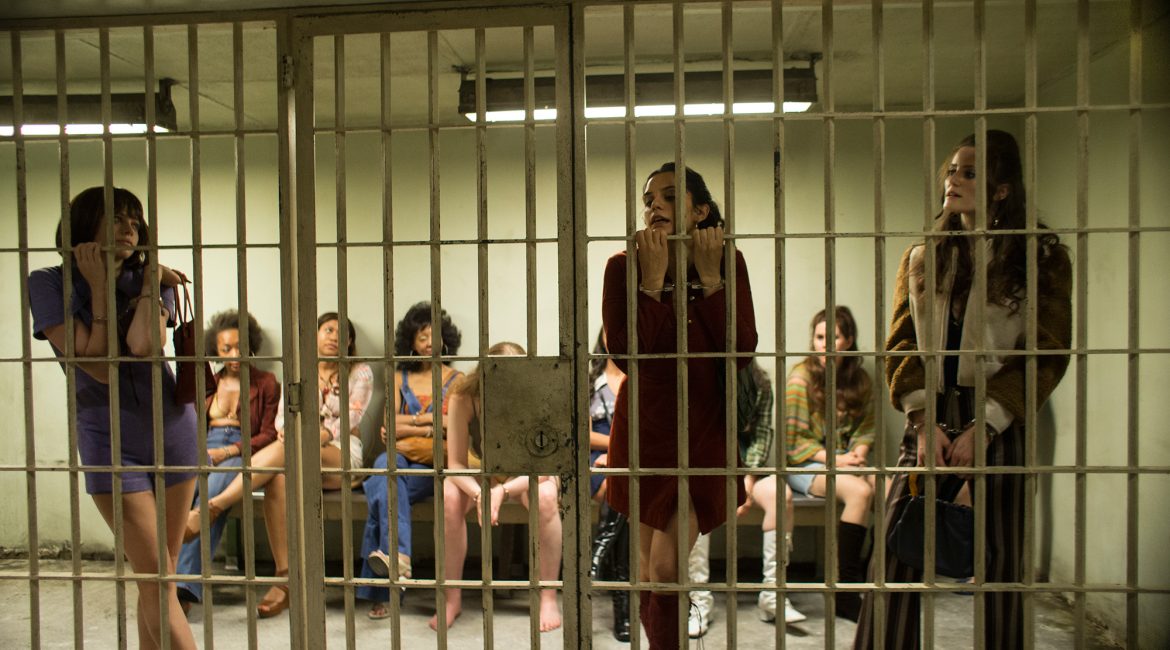The HBO series’ assured storytelling and detailed world-building continues to enrich its expanding milieu. In the second episode of The Deuce, titled “Show and Prove,” patrolmen officers Danny Flanagan (Don Harvey) and Chris Alston (Lawrence Gilliard Jr.) are seen rounding up some of the women working the titular Times Square streets. Upon seeing the officers, they begrudgingly line up near the police van, their reaction more annoyed than alarmed. The pimps, too, seem to know the drill: aside from Rodney’s resigned heckling and Larry’s irritation, there are no signs of resistance. To these players, this arrest is but a routine exercise; a nuisance they’ve come to expect in their line of work, and one the pimps seem to have actually accommodated for. In fact, we see just how arbitrary this policing measure — nicknamed ‘The Ho Patrol’ are, for not only can officers and politicians be bribed to look the other way, but the precinct has actually devised a system whereby each woman is given a grace period of a few days before they can be arrested again — a literal Get out of Jail Free Card that allows any worker apprehended in the previous roundup to skip the next one (everyone is given a date-stamped property voucher), lest the volume of arrests would completely overwhelm the system.
At the police station, the casual familiarity by which the women enter their holding cell unprompted by the officers tells us that they are no stranger to these surroundings, and they know exactly where they’re going. There’s even some ball busting between some of the prostitutes and the officers on desk duty; one named Terese enjoys reminding Officer Rizzi (The Wire alum Michael Kostroff) that she makes more money than him on any given day. We’re even treated to a charming scene in which Alston (who’s more rational and thoughtful than Flanagan) treats the women to Chinese takeout and soft drinks, walking down the cell as he takes their dinner orders one by one; “I’ll have the No. 9 with lobster sauce,” notes one arrestee. “The No. 9 already comes with lobster sauce —you sayin’ you want extra?” “Yeah.” He even allows them to sit outside and eat their meal in the station courtyard un-handcuffed while the CO is away. Outside, the vibe is relaxed and conversational, as cops and workers shoot the shit — Alston inquires about a worker’s black eye, but it’s not like he plans on doing anything about it — and they all know to quickly shuffle back inside the cell and resume the façade before the CO returns.

The ordinary and almost reflexive nature of these proceedings, combined with the acquiescent friendliness between those on opposite sides of the law, speak volumes of the show’s view of policing sex work — something that Alston seems to understand deep down — for there will always be a healthy stream of supply and demand when it comes to the business of selling sex, and no law will stop that. All of which hammers home the fact that the ‘Ho Patrol’ is really just a ceremonial display of law enforcement that does little more than perpetuate the status quo. The effect of this can be heard when Officer Rizzi reads off the daily dossier of robberies, murders, and rapes that continue to plague the Deuce.
In the rich and sweeping world that Simon and Pelecanos have created, each character knows their role, and everyone plays their part in keeping this social ecosystem functioning. Simon’s body of work reflects his belief that real systemic change is a rare and agonizingly slow process; and that most of the time, what we perceive as social progress is really just the changing institutional faces of inequality through the decades. Like a well-oiled machine, the wheels of the status quo will keep turning and society’s most vulnerable will continue to suffer — so for the officers, keeping up appearances is just part of the grind: same shit, different day.
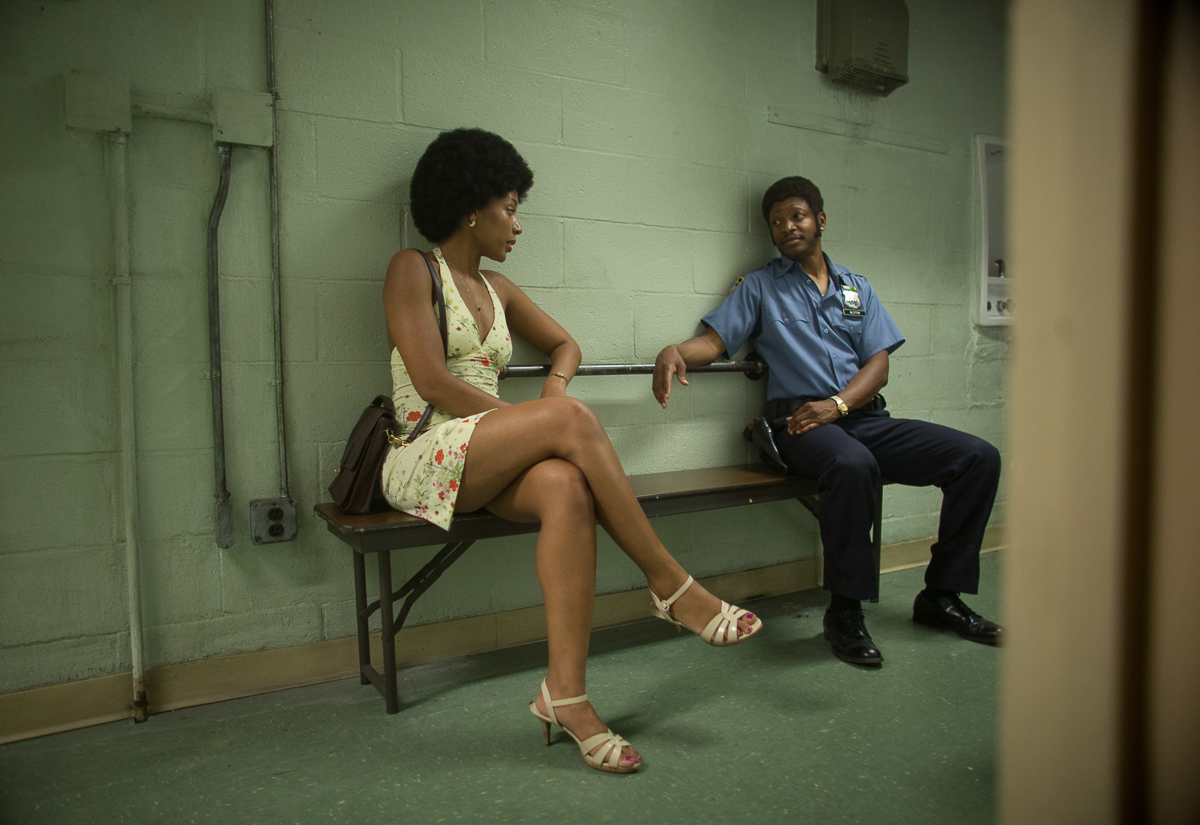
Natalie Paul (Sandra) and Lawrence Gilliard Jr (Alston)
As we get a better sense of the symbiotic relationship that alsexists between the different groups operating within this social apparatus, we see some characters make inroads to improve their financial situations. Having gotten her first taste of the adult filmmaking world, Candy’s been bit by the porn bug and doesn’t want to go back. Her curious fascination with the equipment used on set ignites a creative spark, and she sets out to learn the technical ropes so she can eventually get behind the camera. Looking back on the pilot episode, the posters of Marilyn Monroe and Elvis that adorn the walls of Eileen’s childhood bedroom are the first signs of Candy’s Hollywood dreams, so it’s no surprise that she wants “to make movies” — and by telling her story, the series legitimizes porn as a form of art. Aside from wanting to flex some artistic muscle, Candy’s newfound inspiration also stems from her fiscal pragmatism, her desire to escape the dangerous indignities of the streets, and her keen foresight into porn’s economic potential and viability. Given the industry’s success and mainstream ubiquity in Europe, she realizes it’s only a matter of time before America decides to loosen their obscenity laws and capitalize on the booming market — and when it does, she wants to be one step ahead.
There’s an illuminating scene early in Episode 3, titled “The Principle Is All,” where Candy and fellow prostitute Ruby (aka “Thunderthighs”) visit a studio in which a porn scene is ostensibly being filmed. Yet unbeknownst to the men paying 40 bucks a pop to see a porno being shot in person, there’s no film in the camera — an ingenious loophole given that in those days it was illegal to film any hardcore scenes depicting genitalia, so should they get busted, the director can say he’s making performance art. In that moment, Gyllenhaal’s dismayed reaction communicates so much without a single word: she’s floored that people would pay so much to merely watch others have sex — a potent testament to the power of sexual voyeurism — and we see the entrepreneurial bulb in her mind light up.
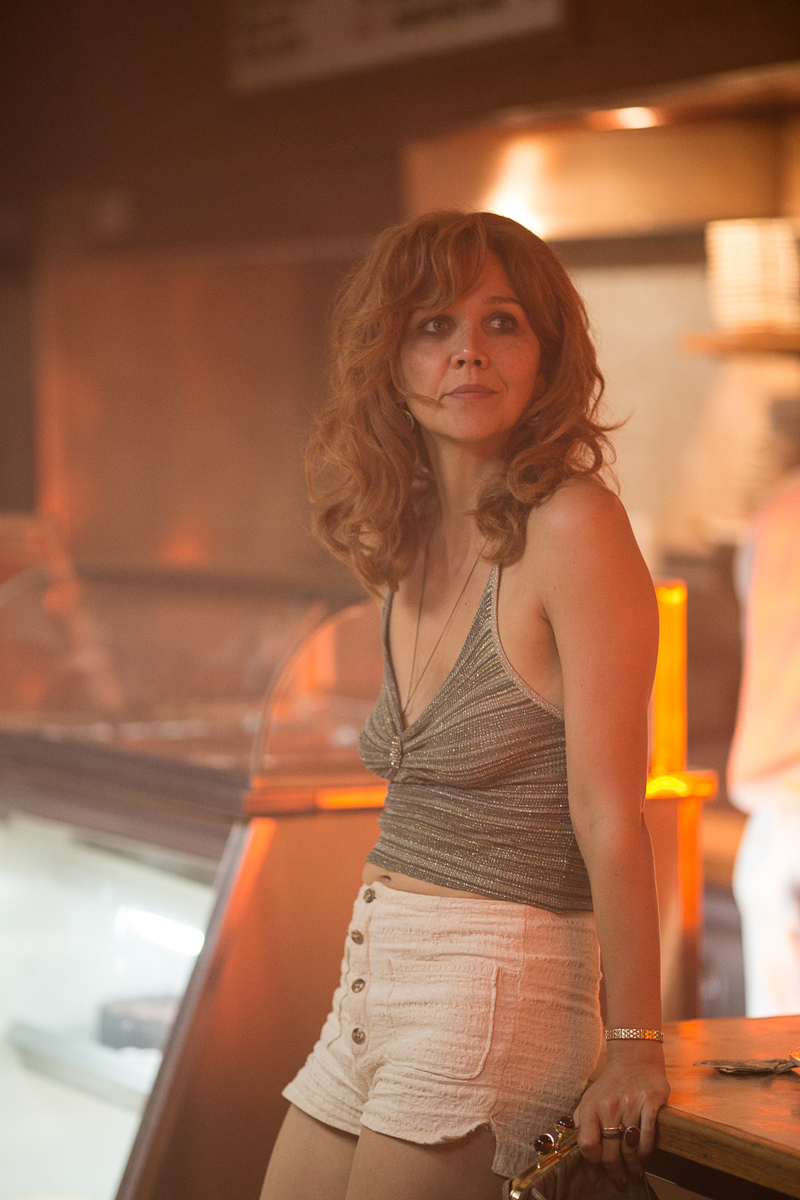
Maggie Gyllenhaal (Candy)
At the same time, Candy is desperate to quit prostituting, and a series of rattling encounters she has in ‘The Principle Is All’ are a vivid reminder why. From being spooked while trying to engage a potential john, and having to remind another that anal sex with customers is in fact not a pleasant experience for her or her fellow prostitutes; to learning that a regular of hers has the clap, and witnessing a passerby get stabbed on the sidewalk — Candy has had enough, all too aware that she’s simply too old for this shit. If there’s one thing Eileen takes pride in other than her son, it’s her financial independence, and she knows that porn is the safer, more lucrative, and stable option for her and her son. Indeed, if the pilot episode taught us that sex is money, the takeaway of ‘The Principle Is All’ is that time is money, especially for these working girls — and throughout the episode, we see money constantly changing hands, with the cost of every transaction noted in detail.
There’s a narrative symmetry throughout the series that offer interesting parallels between different characters and their circumstances — a striking example being that as one character (Candy/Eileen) tries to get out of the street business, we see another, Lori, continue her transition into it; learning the ropes from her pimp C.C., and experiencing her first harrowing encounter with a violent john. Though she’s a quick study and a hard worker who’s eager to please C.C., it remains to be seen whether this frightening ordeal gives her any pause. Indeed, the scenes between Lori and C.C. are some of the series’ most satisfying, and their relationship paints a fascinating and nuanced picture of the pimp-prostitute dynamic. It’s obvious C.C. takes a particular liking to Lori and perhaps even favors her, yet even his kind gestures are transparent in their sneaky manipulation. And though he may give Lori a gold necklace, “confide” in her about the singular loneliness of pimping, and even seems to have carved out a pseudo-family unit with his ladies, these are but a means to an end. At the end of the day, all that matters to C.C. is his money, and whether he uses the stick or the carrot, he will make sure he gets paid.
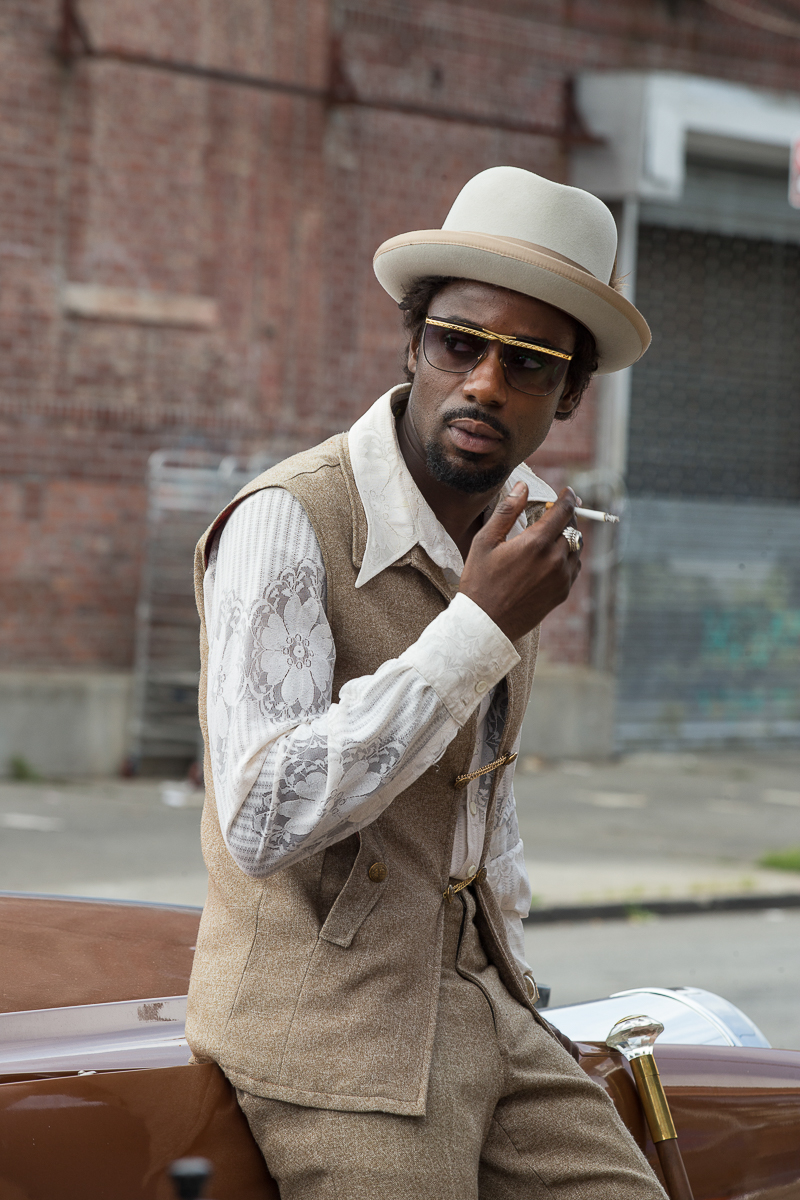
Gary Carr (C.C.)
Elsewhere, other characters are also trying to improve their circumstances. Like Candy, Vincent is breaking into the world of nascent entrepreneurialism, and following a business deal with mob boss Rudy Pipilo, he acquires a struggling gay bar by the name of Penny Lane, resuscitates it, and renames it The Hi-Hat. The bar’s grand opening scenes late in episode 3 are a joy to watch, precisely because we get to see Pimps, prostitutes, cops, drag queens, mobsters, and students — an array of characters from all sides of the racial, sexual, professional and socioeconomic spectrum — commingle under the same roof. There’s an emotional payoff in waiting until nearly the first season’s midpoint for these characters to interact for the first time: at this point, we’ve invested more than three hours in the show’s world-building and have come to intimately know, so it’s satisfying to see their disparate paths begin to cross. Adamant that The Penny Lane’s former queer patrons are welcome anytime, Vincent transforms The Hi-Hat into a vibrantly diverse safe space where one can witness the singular delight of mob capos chatting it up with drag queens — a distilled microcosm of the show’s breadth, scope, and diverse social milieu.
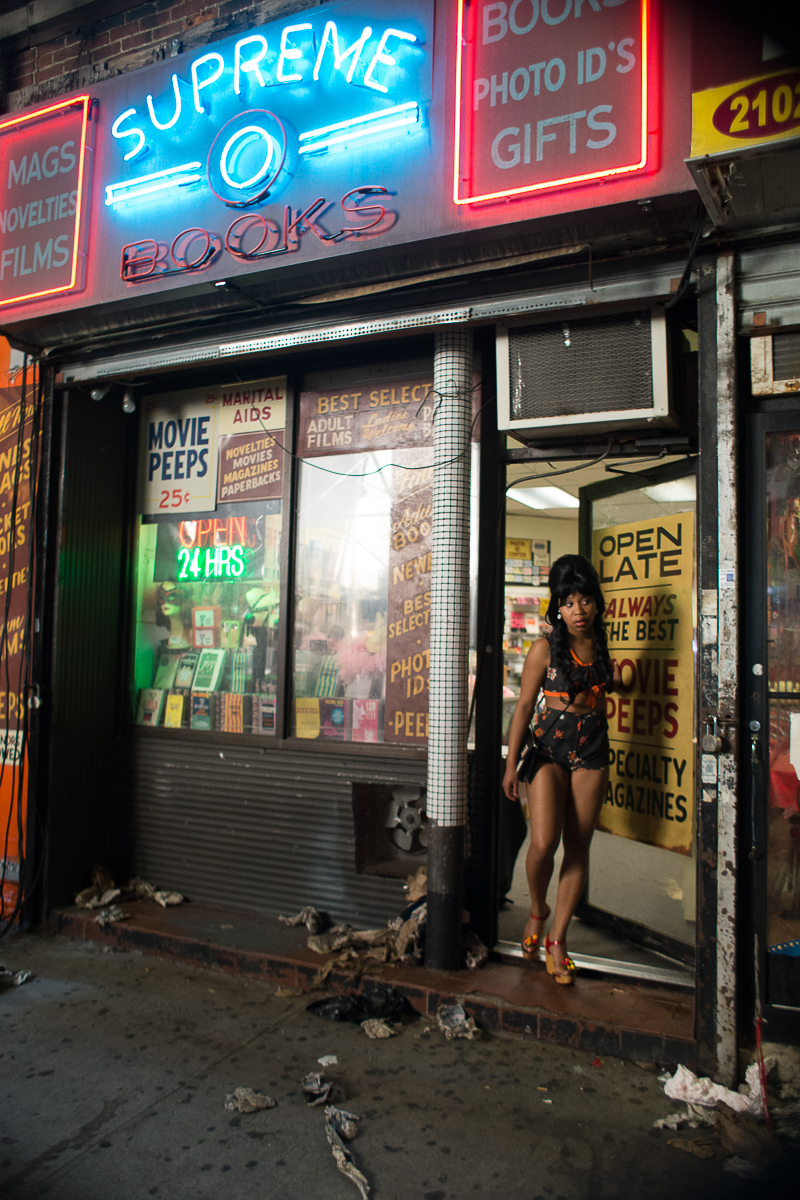
Dominique Fishback (Darlene)
As a business establishment that embodies the free market’s dangerous allure, The Hi-Hat invites us to consider capitalism’s social implications and moral dilemmas. Will Vincent end up regretting his decision to go into business with the mob, or will the added income ultimately offset his misgivings? And as a friendly acquaintance of the Deuce’s pimps, Vinnie welcomes their business and company, but the violent culture of pimping isn’t lost on him either; especially after witnessing C.C. erupt firsthand. Out of the multitude of characters we’ve met so far who’ve been lulled into a sense of complacency out of jadedness or self-interest, Vinnie is still a wild card, so whether he continues to look the other way, or his complicity eventually sparks a crisis of conscience, remains to be seen. What is certain is that the world of The Deuce is a gritty, unforgiving, and often bleak one — luckily, our hustlers and misfits can find temporary communal escape at The Hi-Hat, as they kick back and shoot the shit over drinks. Just don’t expect them to carry rosé.
Related article: The Heart and Hustle of HBO’s Must-See New Series “The Deuce”

